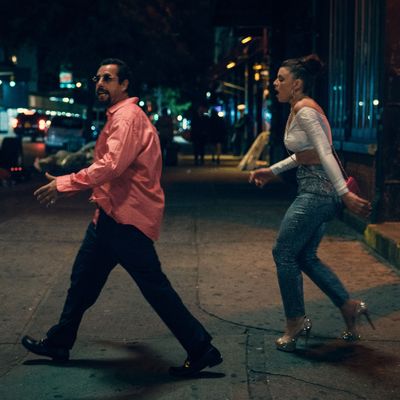
For the Safdie brothers, Benny and Josh, the frame doesn’t frame, not for very long. Someone is always moving in or out, streaking past the perimeter, forcing the camera to swerve right or left in the hope of catching the action before it hurtles on. Life, by implication, is a switchback ride over an abyss, on a road that might drop off at any instant. For Howard Ratner (Adam Sandler), the Jewish jeweler protagonist of the Safdies’ most manic film, Uncut Gems, standing still is akin to nonexistence while motion invites devastation. The shard of space and time in between is where Howard lives, for a spell, and where this awesome, freaky movie is set.
It is not an easy watch, unless you enjoy having your fight-or-flight responses triggered at the outset and continuing (for hours, maybe) after the lights come up. Only Howard could have fun at a film like this, and I use fun very loosely, with a nod to Freud’s Todestrieb — i.e., the death drive. In his first scenes, he waits at his fortified Manhattan jewelry store to receive an uncut gem surreptitiously extracted from a cave and then smuggled into the U.S. from the mines of Ethiopia. The thing — which is inside a fish — is so obviously cursed that it might as well be Imhotep from an old mummy movie. Basketball star Kevin Garnett (played by basketball star Kevin Garnett) is in the store with his entourage and wants the rock something fierce, and when Jewish-jeweler hustle meets black-basketball-celebrity hustle, it’s something to see. The problem is that Howard needs Garnett’s goodwill and deep pockets to keep at bay his creditors, the most formidable of whom is Arno (Eric Bogosian), a saturnine fellow who strives not to let his tribal loyalties (he is Jewish and cut from the same cloth as Howard) interfere with his business. He has two men tasked with collecting, Phil (Keith Williams Richards) and Nico (Tommy Kominik). You don’t want to mess with Nico, but better him by a factor of a thousand than Phil. Phil is bad news squared.
The audience has no choice but to root for Howard, even when he gets out of a jam and promptly leaps into another when he should be kissing the ground and thanking his God for a new lease on life. I would say that Howard Ratner is the ultimate Adam Sandler role, if I didn’t think maybe Adam Sandler is the ultimate Howard Ratner role. They share a metabolism, certainly. Sandler has one great handicap as a performer: His eyes are dead — or else turned so far inward that they’re dead to the world. This makes him credible both as men incapable of embarrassment or men so afraid of embarrassment that they spend their lives throwing up walls. Sandler was perfect as the boy-man who could barely acknowledge his feelings (rage, longing, more rage, more longing) in Paul Thomas Anderson’s Punch Drunk Love, and he’s even more perfect (if such thing is possible) in Uncut Gems, because anger and need are fused, and Howard’s self-destructiveness is a form of aggression. Anyone who would love Howard is in for a pasting, but we have no choice. Howard is the summation of the Safdies’ culture, in which the drive for life collides head-on with the drive for death, and the upshot is cinema.
Sandler does not triumph in a vacuum. He requires co-conspirators, nemeses, immoveable objects to throw himself repeatedly against. Idina Menzel has a bloodcurdling moment or two as the wife who has deadened herself to Howard’s wheedling at obviously great cost. An actress new to me, Julia Fox, is stupendous as the mistress/employee who will never deaden herself to him — who comes fully alive only when she has to keep up. (You want Howard to survive his ordeals for her sake.) Lakeith Stanfield is up to the part and then some as a trickster whose reflexes are even faster than Howard’s. It is a testament to the power of Keith Williams Richards’s performance that I dread seeing him again. Darius Khondji’s cinematography might not win an Oscar, but deserves an Olympic gold medal. This is a hell of a marathon.
I put Uncut Gems on my ten-best list having no idea what I was supposed to take away from it. Only now, as I think back, do I understand that what I took away was my life, and thank you, Safdie brothers, for letting me keep it. In cultures like the Jewish one portrayed here, there is a pressure to act, always act, to seize whatever can be seized or else not advance — as Albert Brooks framed it in Defending Your Life — to the next level of existence. In Brooks’s cosmos, Howard Ratner would represent the highest stage of evolution, which means that the highest stage of evolution is annihilation, which is good to know as we try to be serene on our more middling levels.


